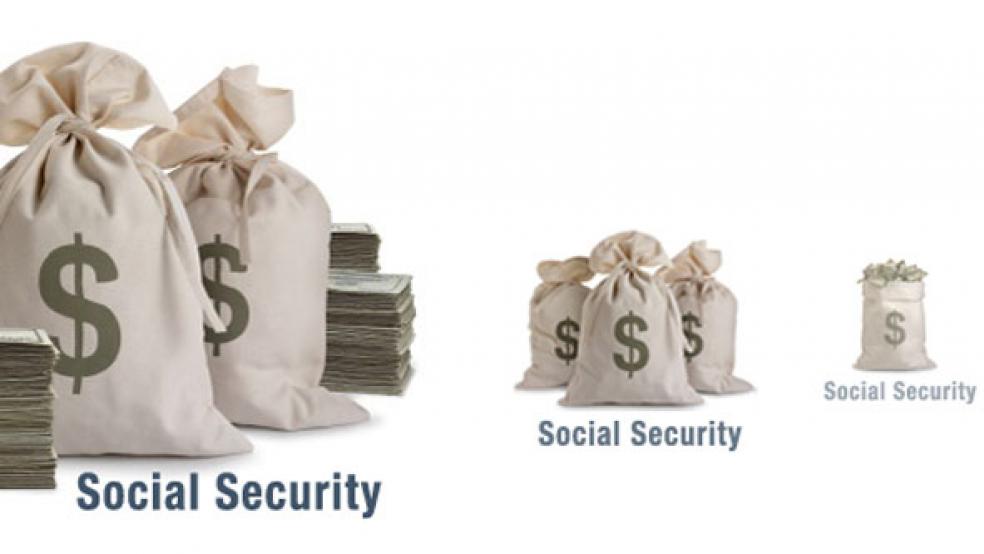While much of the controversy over President Obama’s proposal for tweaking the consumer price index has centered on how it would cut long term Social Security benefits for seniors, the COLA change could raise taxes and resistance to the idea on Capitol Hill.

Known as chained CPI, this alternative formula reflects how consumers change their purchasing habits when prices rise or fall for a broad range of services, including food, housing, clothing and medical expenses. The Congressional Budget Office estimated that government spending on Social Security, Medicare and other benefits would decline by about $216 billion over ten years if this less-generous index were in place.
Media reports that President Obama will include a version of the chained CPI in the fiscal 2014 budget he will unveil on Wednesday prompted an outcry late last week from progressives ranging from Sen. Bernie Sanders, I-Vt., to AARP leaders to AFL-CIO President Richard Trumka. “The President should drop these misguided cuts in benefits and focus instead on building support in Congress for investing in jobs,” Trumka said.
The idea of a switch to a chained CPI has garnered bipartisan support from the Simpson-Bowles Commission, the conservative Heritage Foundation, the liberal Center on Budget and Policy Priorities, and the Senate “Gang of Six” Democrats and Republicans who all view it as a way to rein in entitlement spending and put the financially shaky Social Security trust fund on a sounder long term financial trajectory. Over the long run, the Social Security actuaries estimate that moving to the chained CPI — together with a benefit "bump" for longtime beneficiaries -- would close almost one-fifth of the program's actuarial gap over 75 years.
However, some budget analysts say that the chained CPI could be politically problematic for some conservatives who fear it would become a backdoor way of raising taxes beyond the $600 billion that approved as part of the fiscal cliff deal in January.
That’s because many elements of the federal tax code — including tax brackets, personal exemptions, standard deductions, limits on contributions to 401(k) plans and similar accounts, and key parameters of the earned income and child tax credits — are also adjusted annually for the CPI. "A switch to the chained CPI would raise an additional $124 billion of tax revenue through 2023, according to the Congressional Budget Office."
The chained CPI grows on average by about 0.3 percentage points per year more slowly than the official CPI. The Social Security actuaries assume the gap between the two CPIs will continue to average 0.3 percentage points per year in the future, while CBO assumes the gap will average 0.25 percentage points per year.
According to Congress’ Joint Committee on Taxation, if individual income taxes had been indexed to the chained CPI starting four months ago, by 2021, 69 percent of the gains in revenue would come from taxpayers with incomes below $100,000, while those in the highest income brackets would barely be affected. For example, workers with incomes between $10,000 and $20,000 would experience an increased tax burden of 14.5 percent, while those with incomes over $1 million would just see an increase of 0.1 percent.
Paul Van de Water, a senior fellow at the Center on Budget and Policy Priorities, told The Fiscal Times last week that while “the folks who are even more liberal than we are don’t like chained CPI because it is a reduction in Social Security and other benefits, a lot of Republicans have come out against it because it does raise taxes.”
House Speaker John Boehner, R-Ohio, did not directly address the tax implications of chained CPI in responding critically last Friday to reports that Obama would seek about $1.8 trillion of savings in the coming decade by cutting Social Security and Medicare and raising about $600 billion of additional revenue – mostly by limiting to 28 percent the deductions that individuals in higher tax brackets can claim. However, he made it clear he would not go along with any budget plan – including one with significant entitlement reform -- that would result in higher tax revenues.
"If the president believes these modest entitlement savings are needed to help shore up these programs, there's no reason they should be held hostage for more tax hikes," Boehner said in a statement. "That's no way to lead and move the country forward."
In late December, while Boehner and the president were negotiating a possible cuts-for-revenues swap to avert the fiscal cliff, an aide to Boehner told Bloomberg News that the Speaker wanted chained CPI more than other entitlement cuts, such as raising the Medicare eligibility age. Chained CPI was part of the president’s offer back then. And Senate Minority Leader Mitch McConnell, R-Ky., also endorsed chained CPI in a letter to the President during that period.
During a White House news briefing last Friday, Press Secretary Jay Carney was asked whether Obama’s decision to include the chained CPI inflation adjustment in his new budget would “kick people into higher tax brackets faster” and violate the president’s vow not to raise taxes on the middle class. Carney replied that this was “not the President’s ideal approach to our budget challenges, but it is a serious compromise proposition that demonstrates that he wants to get things done, that he believes that we in Washington ought to do the business of the American people by coming together and finding common ground.”
Congressional Democrats appear divided on the issue. Sen. Dick Durbin of Illinois, the second ranking Democrat in the Senate, told reporters recently, “I think chained CPI is a real possibility, but only if it is crafted in the right way.” He said that nothing would be done to alter the underlying federal retirement program and that the savings would not be used for deficit reduction.
“It’s still our responsibility to make sure that it’s there,” he said at a press breakfast sponsored by the Wall Street Journal breakfast. “What I’m getting to is there are things we can do, if we do them early, over a gradual period of time,” to ensure the solvency of Social Security.
However, Rep. Chris Van Hollen of Maryland, the ranking Democrat on the House Budget Committee, said Friday that he had serious reservations about chained CPI and the effect it would have on seniors. “The concern many of us have is respect to seniors who use an unusually large share of their income in the area of health care which rises more rapidly than other costs, that it may not be an accurate reflection of true costs,” Van Hollen told MSNBC.
Officials at the Center on Budget and Policy Priorities support switching to a chained CPI because they agree with other economists that it is a more accurate measure of inflation. But they are insisting on conditions that would protect long time beneficiaries from financial hardship.
“It does have a lot of downsides,” Van de Water said of chained CPI. “And people who don’t have really high incomes will lose out to some extent. But if it’s part of a deal which has significant revenues and if you provide a certain amount of protections for low-income people and the very old, then out of alternative deficit-reductions policies, it’s something worth considering.”





